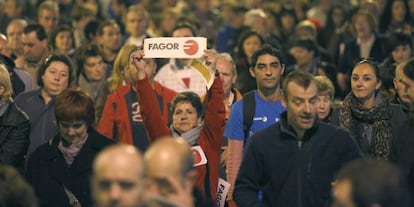Mondragón splits in two
Basque cooperative conglomerate is struggling to decide on how to restructure


Corporación Mondragón, the largest cooperative conglomerate in Spain, “is going to have to move quickly to heal all the wounds left by the shutdown of Fagor Electrodomésticos.” This statement, made by a senior executive at Mondragón, reflects widespread concerns over the weakness of its solidarity-based system, which was built over the course of six decades.
The closure of the Basque business group’s flagship firm Fagor, a leading maker of home appliances, was followed by the resignation of Mondragón’s president, Txema Gisasola, due to internal pressure. This means that as well as the social trauma of 2,000 lost jobs, there is now a power struggle playing out over how the cooperative model — based on self-management by workers — should be restructured.
The latest chapter in Mondragón’s history marks the lowest point for this powerful conglomerate, which comprises 289 business units (110 of which are cooperatives) and 80,321 workers, and which saw turnover of 13 billion euros in 2012.
In October of last year, the other cooperatives in the group refused to bail out Fagor by injecting a further 50 million euros into it (the struggling appliance maker had already received 70 million euros in early 2013, bringing the total received in recent years to 300 million euros). Fagor is renegotiating its 2.5-billion-euro debt with 22 creditors.
What’s in crisis is the way companies are run these days,” says one employee
“There is no doubt that something wasn’t done right,” admits one veteran corporation member, noting that the cooperative system lacks the “agility” to allow for “fast decision-making.”
Koldo Saratxaga, who worked for the Mondragón group for 21 years, says that “the Basque cooperative model is not in crisis; what’s in crisis is the way companies are run these days.”
Gisasola’s departure illustrates this division. “There was a clash between two contradictory visions on the future model for the organization,” explains one executive. The group president, who was the head of Fagor for six years, favored the creation of a holding company with more power for the corporate bodies and less self-sufficiency for the cooperatives. His opponents, basically Orona and Caja Laboral — which happen to be the group’s best-performing units — viewed Gisasola’s attitude as “a threat to the sovereignty and decision-making ability of the cooperatives.”
In this power struggle, according to the same sources, “Gisasola made a quixotic attempt at confronting the windmills for three months, until he realized that the general council [the top governing body, with 12 members] did not express sufficient support for his model.”
“Gisasola was seeking a transformation of the current organization system to achieve a corporation with real decision-making abilities over the cooperatives, which it does not have at the moment. As things stand now, the general council has no power to decide anything in a cooperative’s name. His proposal has been shot down by those who view his ideas as a danger to their independence.”
Gisasola’s departure, which was officially attributed to “personal reasons,” triggered some internal soul-searching that will have to yield a choice between two different business models.
Meanwhile, the corporation is trying to soften the blow of the Fagor closure by relocating its employees in other cooperatives. Some 400 worker-members have already found new positions, and as many more are expected to accept new jobs throughout this year. Another 300 workers are likely to take early retirement.
Tu suscripción se está usando en otro dispositivo
¿Quieres añadir otro usuario a tu suscripción?
Si continúas leyendo en este dispositivo, no se podrá leer en el otro.
FlechaTu suscripción se está usando en otro dispositivo y solo puedes acceder a EL PAÍS desde un dispositivo a la vez.
Si quieres compartir tu cuenta, cambia tu suscripción a la modalidad Premium, así podrás añadir otro usuario. Cada uno accederá con su propia cuenta de email, lo que os permitirá personalizar vuestra experiencia en EL PAÍS.
¿Tienes una suscripción de empresa? Accede aquí para contratar más cuentas.
En el caso de no saber quién está usando tu cuenta, te recomendamos cambiar tu contraseña aquí.
Si decides continuar compartiendo tu cuenta, este mensaje se mostrará en tu dispositivo y en el de la otra persona que está usando tu cuenta de forma indefinida, afectando a tu experiencia de lectura. Puedes consultar aquí los términos y condiciones de la suscripción digital.